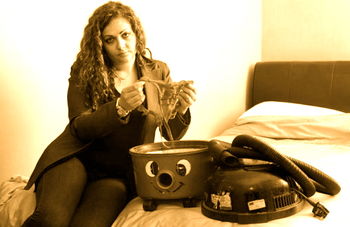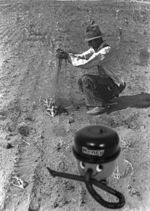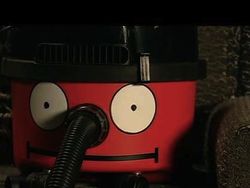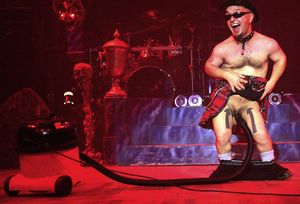President Hoover
| President | |
|---|---|
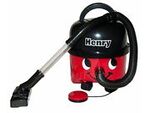 President Hoover in 1945. | |
| Born | 10 August 1925 Model T Ford Factory, Michigan. |
| Died | 20 October 1954 (aged 29) Yukon Ho, Alaska. |
| Nationality | American. |
| Other names | Henry, Kuntschlurper. |
| Occupation | Vacuum cleaner, President of the USA. |
| Known for | Sucking hard, doing blow. |
Henry the Hoover (August 10, 1925 – October 20, 1954) was the 31st President of the United States (1929–1933) and remains the only vacuum cleaner to have ever held the position. His election in 1929, just months before the Wall Street Crash is often held up as a prime example of the cultural arrogance that came with the financial prosperity of the Roaring Twenties.
Historian David Irving summarized the presidency by saying, "In 1929, the greatest nation on earth voted for a vacuum cleaner to become president. This was the American tower of Babel, the moment in which their unseemly levels of pride and decadence angered the gods, and set in chain many disastrous world events, which ultimately led to World War II. But not the holocaust. That never even fucking happened."
Early life
Henry was built by namesake Henry Ford in 1925, who famously said, "You can have him in any color, as long as it's red." The choice of a red face was thought to be a tribute to the industrialist's wife, Clara Jane Bryant, who was widely known to turn a deep crimson as she labored over an act of fellatio.
Ford released the model later that year, drawing attention to Henry's cheerful face in the advertizing campaign, which carried the slogan, "Ladies, with our latest hoover, soon you will be smiling as wide as Henry himself!" Early sales were good if not outstanding, with several thousands Henries being sold in the first 6 months of the year.
Entry into politics
The USA was having the time of its life in the 1920s: prohibition had been repealed, new labor saving devices made household chores a cinch, the increasing number of citizens with telephones meant phone sex was sweeping the nation, and it was all conducted to the background of lively jazz standards. Israel was still a British problem, Osama Bin Laden was just a twinkle in his daddy's eye, and Communists were a curious Slavic invention who seemed to be mostly concerned with long term farming plans. Life was grand.
So grand, in fact, that many commentators were openly questioning the need for a US President. Joanna Corey Sr, one of the first female academics to feature in newspaper articles and radio broadcasts, wrote a book, "What's a President For? or How self-governance is the American way." Jazz singer Fats Waller popularized a similar sentiment with the 1928 hit 'Ain't Worth Electin' .
Into this cauldron of apathy and cockiness stepped F. Scott Fitzgerald. Returning from one of his wild New Year's Eve parties (in early March), he was asked to propose a candidate for the Republican party, and slurred, "Well how's about Henry the Hoover?" The quote, while originally treated as a joke, caught the imagination of the drunk and nihilistic upper classes, and a real campaign began. The New Yorker acquired a Henry the Hoover, and asked in-house writer Dorothy Parker to be head-writer for what would be arguably the Republican party's least credible presidential candidate for over 40 years.
Election Campaign
“Two cars in every garage, and a saucy little sucker in every bedroom.”
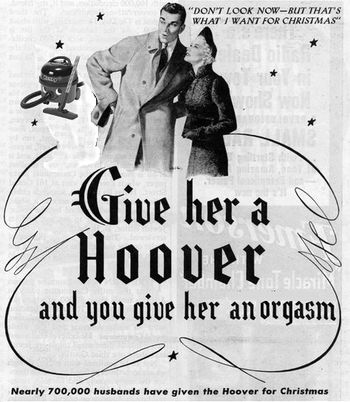
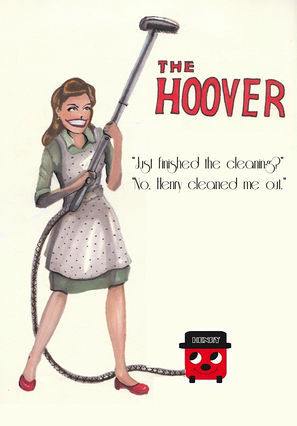
Parker capitalized on the contemporary culture of associating vacuum cleaners with masturbatory pleasure.
Parker launched an electoral campaign like no other, one which was free of any kind of political statement and comprised almost entirely of witty puns and double entendres. On the campaign trail, Hoover was voiced by Charles Curtis, who would later be rewarded for his work with position of vice president.
The Democrats, faced with what many might consider to be the easy task of defeating a domestic appliance in a political election, floundered. Instead of focusing his campaign on the ridiculousness of his opponent, candidate Al Smith disastrously chose to emphasize his own seriousness, and proposed a series of unpopular measures, including reducing the length of baseball games, changing the spelling of "beer" and raising duty on kitten purchases. The final straw was a radio debate in which Smith threatened Hoover, saying, "I'm gonna wipe the floor with you!" to which Curtis ad-libbed, "With a Hoover, you don't need to wipe the floor!" The American public laughed and laughed and laughed, and Hoover swept to a landslide victory. Smith was a broken man, and apparently refused to allow his wife to use any kind of vacuum cleaner until his dying day, when she duly celebrated by having her late husband cremated and hoovered up.
First Hundred Days
The first 100 days of the Hoover presidency were marked by confusion. Vice President Curtis later remarked, "Despite all the crazy momentum that went with the campaign, we never really took the whole thing seriously until we set foot in the White House. Then, when we got there, we didn't know what to do, so we just ordered a dozen crates of absinthe and lined up all these jazz bands and black whores to come over and entertain us. I'm not gonna lie; a lot of titties got sucked those first 100 days. And not just by Henry."
That is not to say that Hoover never left the White House. In his first 120 days in office, he held more regular and frequent press conferences than any other President, before or since. However, due to his drug intake, they were often rambling, with one reporter writing, "The President, or Vice President - they claim to always speak at the same time these days - talk more quickly than anyone I have ever met. The press conferences take in a range of emotions and always feature a certain amount of crying, but also many moments of almost uncontainable joy, and bursts of hyperactive energy."
The most notable act to be passed in this period was the SuckerBall Act, in which Hoover attempted to popularize a sport he had made up in the Oval Office on the rest of the nation. It was best described as a combination of tennis and volleyball but one which, crucially, required a human to have the sucking power of a vacuum cleaner, never managed to oust baseball as the nation's favorite game, although it was briefly more popular than ice hockey.
The Wall Street Crash
During the 1920s, share prices had increased so irresistibly that traders started to stop checking their portfolios, and simply paid their clients whatever they asked, while they sat in their offices and chewed cigars and had affairs with their pointy-breasted secretaries. It could not last.
On October 29, 1929, during a rowdy week-long party at the stock exchange, one trader, Thomas W. Lamont, was performing a comedy routine punctuated with bursts of melodic flatulence, which he called the Wall Street Splash. Reaching about himself looking for something to resemble toilet paper, he happened upon the long neglected ticker tape and realized the stocks had fallen 11% since anyone had last checked.
Lamont screamed and soiled himself on the spot, and began selling all his shares. His drunken colleagues, some in jest and some in earnest, began copying him, and by the end of the party on Sunday, the US had had 23% wiped off the value of its economy, technically promised its northern forest land to Canada, and sold the rights to potatoes to Russia. It was to prove the defining week of Hoover's presidency.
The Great Depression
The economic fallout of the Wall Street Crash led to the Great Depression, a period that lasted for over a decade in which the US had trouble sleeping, never shaved, and hardly wore anything except for an old T shirt and some sweat pants.[1]
The administration was left completely paralyzed by the crisis. Their most significant move in the aftermath of the crash was to have Henry play Danny Boy on the bagpipes. The performance was met with bemusement which quickly turned to anger, as more and more Americans lost their jobs and found themselves being press-ganged into taking part in the Dust Bowl, the annual SuckerBall championship game, which proved to be little more than a filthy predecessor to the Super Bowl.
Hoover's image suffered greatly during the following years. As if the depression itself wasn't a significant enough obstacle, Henry had made himself a powerful enemy in William Randolph Hearst after an unfortunate incident at the 1930 White House Correspondents' Association Dinner in Washington.
Towards the end of the evening, an unusually emotional Hearst was recounting the tale of the day his beloved snow-globe, Rosebud, slipped from his hand and smashed. Hearst remembered how he spent months trying, fruitlessly, to piece Rosebud back together. During an awkward silence, Curtis is alleged to have put his arm around Hoover and said, "A broken snow-globe? We would have hoovered that shit up like that!"
Hearst immediately attacked Hoover, attempting to stamp on his dust nozzle, and although the pair were separated and Hoover was wheeled to safety, Hearst swore revenge. So began a vicious three year campaign in which Hearst used his newspapers - notably the New York Morning News and the Washington Herald - to claim Hoover was a political puppet under the control of a sexually deviant Jewish-Communist Hollywood sect led by Orson Welles and Charlie Chaplin.
Drug addiction: Hoover Damn
By 1932, the severity of the depression was taking its toll on Henry and Curtis, and both developed a serious cocaine habit.
Henry's (well, Curtis's) penchant for crying, "Damn!" after a bout of snorting led to the popularization of the expression 'Hoover Damn' among Washington drug addicts, as a way to refer to a hit of cocaine, due to the powerful image it created of Henry literally hoovering up the drug. Decades later, Quentin Tarantino made a sly reference to the term in his 1995 film Pulp Fiction.
Henry's drug habit was kept away from the public at the time, but rumors began circulating at the end of his presidency. It did considerable harm to his already tarnished reputation, and in 1961, he was officially declared only the 14th American President to have a drug habit.[2] His successor as President, Franklin D. Roosevelt, with whom he had an infamously fractious relationship, took the opportunity to mock his rival by naming the Hoover Dam "in his honor" in 1935.
Loss to Roosevelt
In 1933, Hoover lost the presidential election to Roosevelt who had emphasized his humanity by pointing out he was so mortal and human he couldn't even walk properly. Much was made of Hoover's 1932 gaffe, "Prosperity is just around the corner," when a more sober man might have admitted that 1932 America couldn't have found prosperity if it had had Google Maps to play with. To his credit, Hoover persevered with his "around the corner" predictions, including: "I do not believe another war is around the corner," (1938),[3] "I think German defeat is right around the corner," (1942), and "I think a Red Sox World Series win is right around the corner," (1951).
The New York Times noted that Hoover had "entered the White House in a blizzard of publicity and exited in a blizzard of yeyo," and Roosevelt himself had an ignominious encounter with his predecessor on his first day as President. In his memoirs, Roosevelt recorded, "I entered the Oval Office and found President Hoover careering around the room desperately vacuum cleaning the carpet. At first I thought it was a kind gesture, that he was doing a last minute clean of the house for us. It turned out that he was scouring the carpet for the last traces of cocaine. He had a drug habit and a rug habit! Ahahahahahahahahaha! Anyway, he sucked big time."
Life after the Presidency
Hoover and Curtis relocated first to New York and later to Los Angeles where their drug addictions continued. Hoover would often leave his latest paramour a note saying that he was "going fishing" as a euphemism for what could be days or weeks away on a drug-filled bender.
Hoover and Curtis liked to drive cars, often in the wrong direction on busy highways, and go on wandering journeys, heading up to the mountains, or deep into the woods, to go "fishing" in relative solitude.
In his private time, Hoover began to write Fishing For Fun — And To Wash Your Soul, a work that went unpublished in his lifetime, but which has since been proclaimed as a strong influence on beat poets and Gonzo journalists for its evocation of a lost America, its harrowing and naked depiction of drug abuse, and its almost bafflingly detailed descriptions of floor hygiene in contemporary USA.
Hunter S. Thompson wrote in the foreword to the 30th anniversary edition, "The Edge: there is no honest way to explain it because the only people who really know where it is are the ones who have gone over. Henry the Hoover not only went over the edge, he went around all the corners and got in all the nooks and crannies."
Although many of his friends and supporters called upon Hoover to speak out against FDR's New Deal and to assume his place as the voice of the "loyal opposition", Hoover did not do so, not least because he was a vacuum cleaner.
The Midget Sex Episode
Following World War II, Hoover became friends with President Harry S. Truman, who even managed to have the less than beloved Hoover's face printed on the 20 dollar bill.
In 1946, in what he would later ruefully describe as an attempt to focus his predecessors' minds and distract them from drugs, Truman selected Hoover and Curtis to tour Germany to ascertain the food status of the occupied nation. They toured what was to become West Germany in Hermann Göring's old train coach but their behavior, one German official would later note, was more typical of 1920s playboys than 1930s Nazis.
Initially propped up by a stash of cocaine they had brought with him from the US, Hoover turned to schnapps, prostitutes and strip clubs to satisfy his hedonistic urges a week into the tour after finding local drug dealers hard to come by. His fondness for giving prostitutes orgasms earned him the nickname Kuntschlurper, a term so notorious that it is still used today in Germany by the younger generations to refer to visiting American sex tourists.
On May 21 1946, they entered the Achtung Baby stripclub in Frankfurt where, among others, midget sex performer Franz Pippenheimer was performing. Henry, who had begun the night "moderately intoxicated" according to special service agents, spent 4 hours drinking and fraternizing with the female performers of the club, before both he and Curtis became increasingly vocal in their abuse of Pippenheimer. Obsessed with the potential size of Pippenheimer's penis, which the performer insisted on keeping hidden under his kilt, Curtis slurred, "If you get it out, he will suck it. He will suck it in front of all these people."
Pippenheimer, who was obviously a little upset at this point, obliged. The resulting photo, taken by an entrepreneurial stripper, was published the next day, and became the defining legacy of President Hoover. President Truman, who had long admired Hoover's way with the ladies, immediately banned him from appearing at any governmental event, and asked for all Americans to draw President Andrew Jackson's face on the 20 dollar bill until the Federal Mint was able to replace the note permanently.
Charles Curtis never made it back from post-war Frankfurt, and was last seen in drag performing with an all-girl cabaret troupe in June 1946.
Retirement and death
President Hoover was brought back to the US by his team of agents, subsequently withdrew from public life, and died in 1954 aged just 29. Little is known of his last years, except that they were spent in the wilderness in rural Alaska, and he is thought to have kicked his drug habit and got clean.[4] He lived his final days without any human company, and the Alaskan police found him dead at his cabin after being alerted by a neighbor. He lay in his bed, next to a broom and a mop.
References
| Featured version: 18 July 2013 | |
| This article has been featured on the main page. — You can vote for or nominate your favourite articles at Uncyclopedia:VFH. | |

